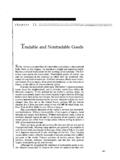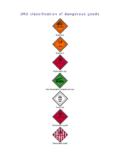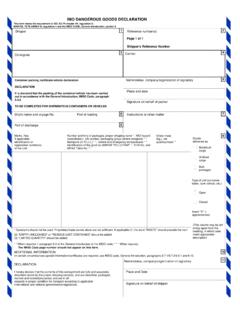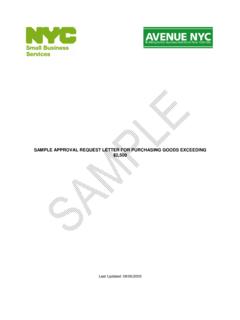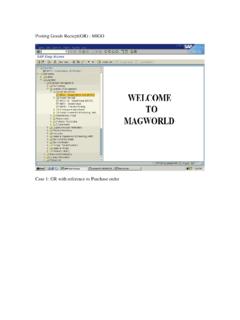Transcription of Understanding Dangerous Goods - SPEED CARGO
1 Understanding Dangerous GoodsMSDS (Material Safety Data Sheet) A Material Safety Data Sheet (MSDS) is a document that contains information on the potential hazards (health, fire, reactivity and environmental) and how to work safely with the chemical product. The most important information is section 14 (Transport Information) UN number -four-digit numbers that identifyhazardous substances, and articles IMO class -uniform international code for the transport of Dangerous goodsIMDG Code Classification System Dangerous Goods are classified into 9 classes according to properties. The way in which different classes of Dangerous Goods are handled in transport will depend upon these properties and hazards, for example: The type of packaging that can be used. What classes of Dangerous Goods can be transported together in freight containers.
2 Where the Goods can be stored within the port and on the Code Classification SystemThe 9 classes: Class 1 Explosives (ammunition) Class 2 Gases (aerosols) Class 3 Flammable liquids (paint) Class 4 Flammable solids (matches) Class 5 Oxidizing substances and organic peroxides (oxygen) Class 6 Toxic and infectious substances (poison) Class 7 Radioactive material Class 8 Corrosive substances (acid / alkali) Class 9 Miscellaneous Dangerous substances and articles These 9 hazard classes have been established internationally by a United Nations (UN) committee to ensure that all modes of transport (road, rail, air and sea) classify Dangerous Goods in the same Code Classification SystemHazard labelsEach of the hazard classes are also identified by labels: Dangerous Goods handling procedure in SingaporeGeneral ProcedureCheck whether item is DG / non DGMSDS Section 14 Transportation InformationUN NOIMO class (subrisk if any)Proper Shipping Name-If above info is present: Item is DG-If absent: Confirm with MPA officer, PSA Group for IMO / UN Check whether item belongs to PSA Group 2 or 3 DG Consult DG Grouping Enquiry Portal PSA Group for IMO / UN Key in UN NO and retrieve PSA Group Example as below:Checking PSA Group for IMO / UN If stated (non otherwise specified) behind chemical name, please confirm DG Group with PSA Chemcare officer Example reply from Chemcare officer.
3 Checking PSA Group for IMO / UN If stated flash point in chemical name, DG Group is determined by flash point stated on MSDSH andling DG Group 2 & 3 CMS Singapore do not handle IMO 1 (explosives) and IMO 7 (radioactive material) and PSA Group 1 (commodities are explosives (IMDG Class 1), very flammable liquids (IMDG Class , ), certain flammable or pyrophoric solids or organic peroxides (IMDG , , ), flammable gases (IMDG Class ) Example of PSA Group 1 Specific chemical that unable handle in SingaporeHandling DG Group 2 & 3 DG Group 3 can be store and handle in Keppel Distripark (KD) CMS warehouse DG Group 2 only store and stuffing / un-stuffing at DG warehouse (F5) Additional handling charges incurred from F5 for DG Group 2 CARGO Export DG Group 2 CARGO must be last slot to stuffing at F5 warehouse Import DG Group 2 CARGO must be un-stuffing at F5 F5 Handling charges Import Un-stuffing of DG CARGO (charges is based on DG CARGO distance from container door) DG CARGO wharfage charges Forklift charges DG store rent charges DG Group 2 CARGO monitoring charges Container shifting from F5 to CMS warehouseF5 Handling charges Export Stuffing of DG CARGO (charges is based on DG CARGO distance from container door))
4 DG CARGO wharfage charges DG store rent charges DG Group 2 CARGO monitoring charges Container shifting from F5 to CMS warehouseLCL DG TARIFF FOR EX SINGAPORE TO VARIOUS DESTINATIONIMPORT LOCAL CHARGES IN SINGAPORE FOR DG CARGO For PSA Group 3 Collect in office upon collect D/O-SGD 50 per shipment (forwarder/ co-loader)-SGD 150 per shipment (direct consignee) Collect in warehouse upon collect CARGO -SGD 30 per w/m (forwarder/ co-loader)-SGD 40 per w/m (direct consignee)IMPORT LOCAL CHARGES IN SINGAPORE FOR DG CARGO For PSA Group 2 Collect in office upon collect D/O-USD 400 per shipment (forwarder/ direct consignee) Collect in warehouse upon collect CARGO -SGD 30 per w/m (forwarder/ co-loader)-SGD 40 per w/m (direct consignee)LCL DG TARIFF FOR TRANSSHIPMENT TO VARIOUS DESTINATION VIA SINGAPORE ..\..\probook2\Desktop\TS LCL DG TARIFF FOR PSA GROUP MATTER OF HANDLING DG DG CARGO must stuffing near to container door DG information ( IMO, UN no) MUST be declared in House Bill of Ladings Otherwise DG information MUST be stated on pre-alert document

